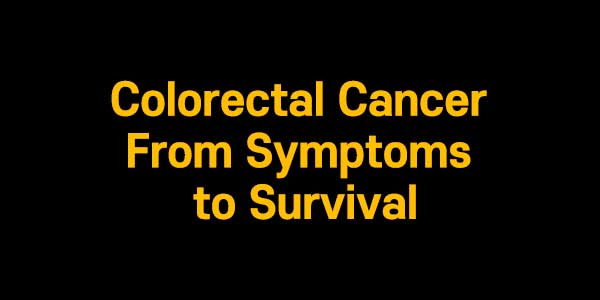
Ever had persistent abdominal discomfort or sudden changes in your bowel habits and thought, “It’s probably nothing”? Well, sometimes it’s more than just stress or bad food.
Hey there, friends 💬 Let’s get real for a moment. Talking about anything related to the colon isn’t exactly dinner-table conversation, right? But did you know that colorectal cancer is one of the most common and treatable cancers if caught early? Whether it’s for you, a loved one, or you're just being proactive (go you! 🙌), this post is here to walk you through everything — from early signs and causes, to what you can eat and how to prevent it. Let’s dive into this important topic together with no fear and a whole lot of honesty 💛
📋 Table of Contents
What is Colorectal Cancer? 🤔
Colorectal cancer is a type of cancer that starts in the colon or rectum — the final part of your digestive system. It usually begins as small, benign clumps of cells called polyps, which can eventually turn cancerous over time. The good news? With regular screening, many polyps can be detected and removed before they become dangerous 🙌 This type of cancer affects both men and women and is often silent in the early stages — making awareness and early detection super important!
Causes and Risk Factors 🔍
| Cause / Risk | Description |
|---|---|
| Genetics | Family history of colorectal cancer or inherited syndromes like FAP or Lynch syndrome increase your risk. |
| Diet | A high intake of red or processed meat, and low fiber consumption can elevate risk. |
| Age | Most colorectal cancer cases are diagnosed in people over 50. |
| Lifestyle | Sedentary habits, smoking, obesity, and alcohol use can increase your chances. |
Symptoms by Stage 📊
Symptoms can vary depending on the cancer's stage and location. In early stages, it’s often silent. As it progresses, watch out for:
- Changes in bowel habits (constipation or diarrhea that lasts more than a few days)
- Blood in stool or rectal bleeding
- Persistent abdominal pain or cramps
- Unexplained weight loss or fatigue
- A feeling that your bowel doesn’t empty completely
Treatment Options & Strategies 💉
Treatment depends heavily on the stage of cancer. The earlier it's found, the more options you have (and the better the outcome 💪). Here's what treatment could look like:
- Surgery – The most common method, often curative for early stages
- Radiation Therapy – Especially effective for rectal cancer
- Chemotherapy – Used when cancer has spread or after surgery to kill residual cells
- Targeted Therapy – Attacks specific cancer genes or proteins
- Immunotherapy – Boosts your immune system to fight cancer cells
Recommended & Avoid Foods 🥦❌
| Eat More | Avoid |
|---|---|
| Leafy greens, berries, broccoli, carrots | Processed meats (like bacon, sausage) |
| Whole grains and legumes | High-fat fried foods |
| Omega-3 rich foods (salmon, flaxseed) | Sugary drinks, excessive alcohol |
Tips, Prevention & FAQs 🙋♀️
- Start screening at age 45 (earlier if you have risk factors)
- Stay active — 30 min of walking a day helps digestion
- Quit smoking and reduce alcohol intake
- Eat a fiber-rich diet and drink enough water
- Manage your weight and blood sugar levels
What age should I start screening for colorectal cancer?
For most people, screening should begin at age 45. If you have a family history or other risk factors, talk to your doctor about starting earlier.
Can colorectal cancer be cured?
Yes, especially if it’s caught early! Surgery is often very effective, and many people go on to live cancer-free lives.
Does blood in stool always mean cancer?
No, but it's always worth checking out. It can also be caused by hemorrhoids or minor tears — but better safe than sorry!
Are colonoscopies painful?
Not really. Most people are sedated during the procedure and feel little to no discomfort. It’s quick, safe, and can save your life.
What’s the survival rate?
When detected early, the 5-year survival rate can be over 90%. That’s why regular screening is a game changer.
Can diet alone prevent colorectal cancer?
A healthy diet helps lower risk, but it’s only one piece of the puzzle. Regular screenings, exercise, and avoiding tobacco are also key.
Thank you so much for taking the time to read through this important guide on colorectal cancer. 🙏 I know — it’s not always easy to face these topics head-on, but awareness is power. Whether you're here out of curiosity, concern, or care for someone else, I hope this post brought you clarity and confidence. If this helped even one person take the next step toward prevention or diagnosis, it’s worth every word. 💛 Have any questions, personal stories, or encouragement to share? Drop them in the comments below — let’s talk, support, and grow together! ❤️
colorectal cancer, colon health, digestive cancer, cancer symptoms, cancer prevention, colonoscopy, rectal cancer, cancer diet, healthy bowel habits, cancer awareness